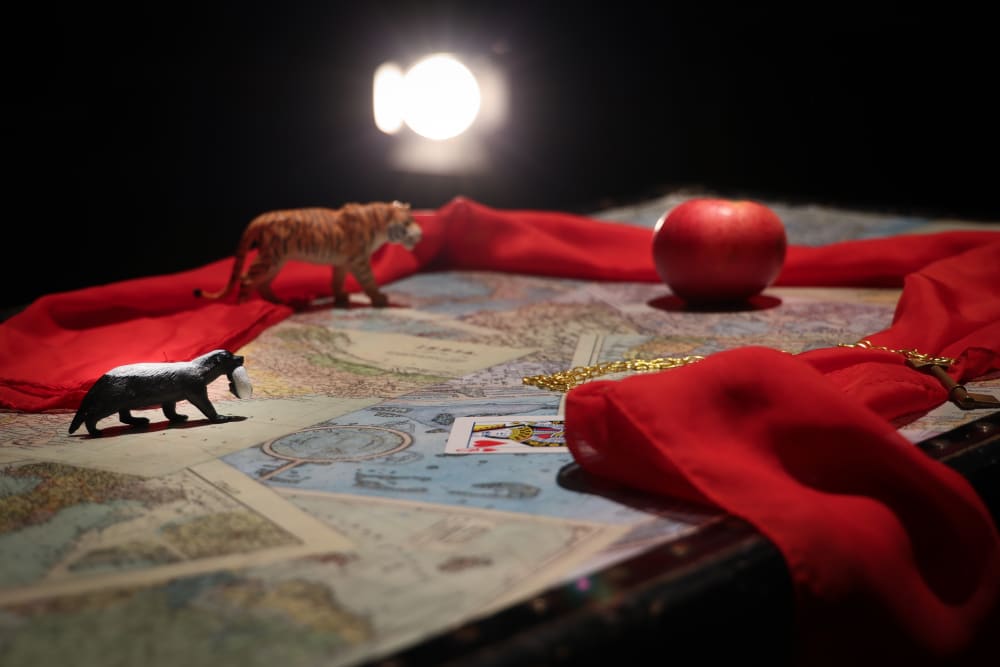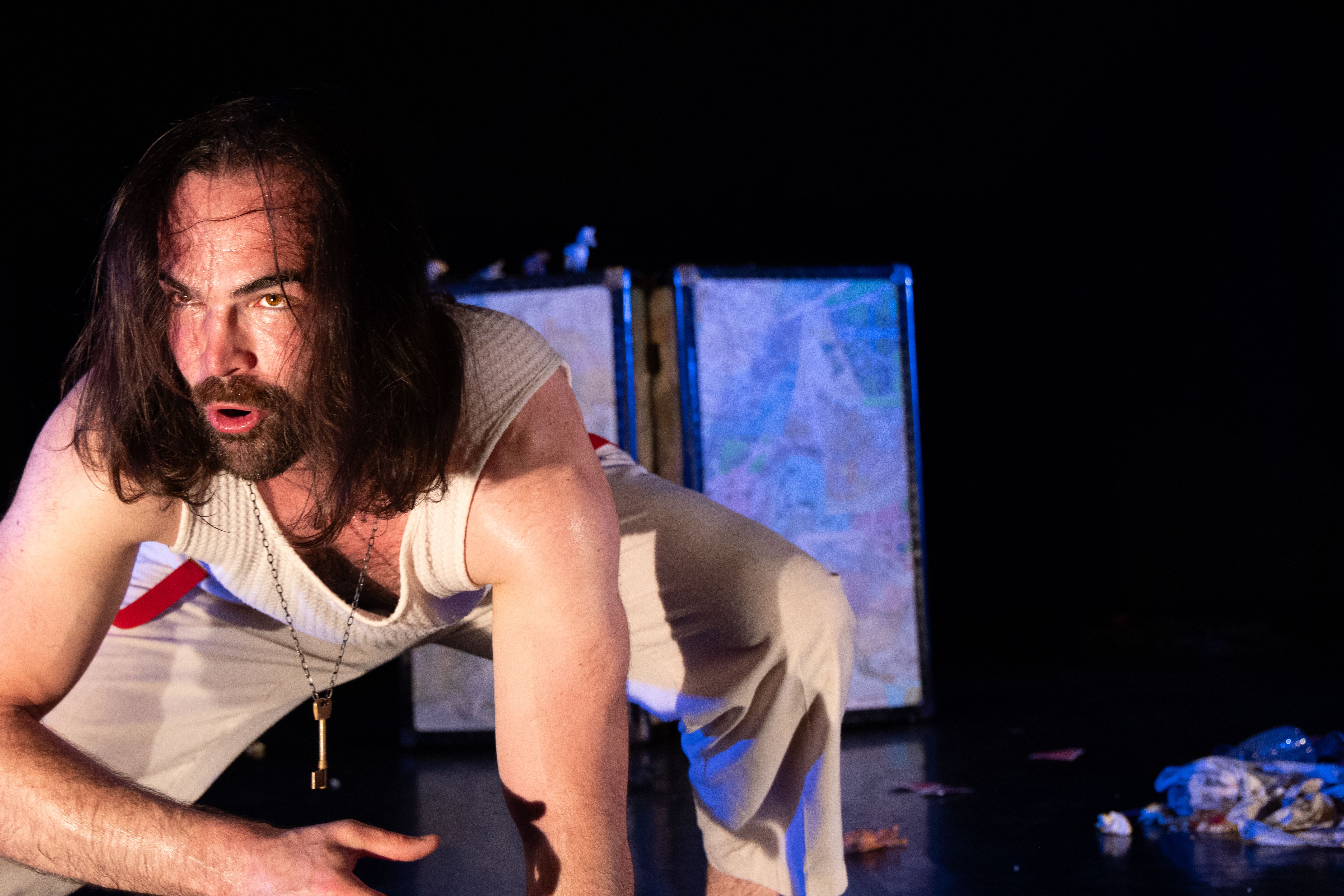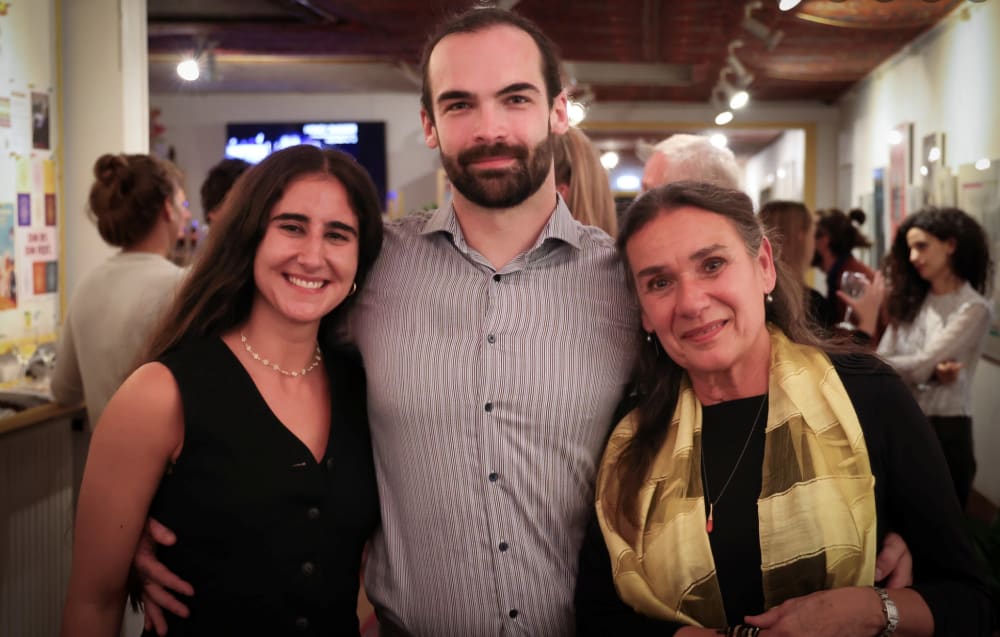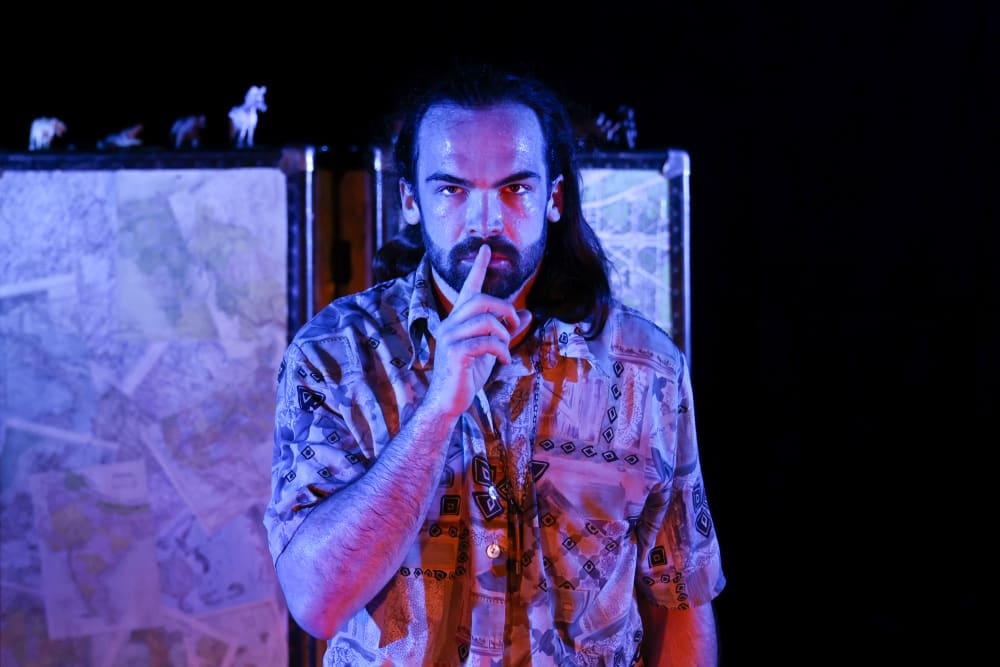
Honey Badger: An Interview with BA (Hons) Acting and Performance alumni, Juraj Benko and Arielle Zilkha

- Written byEuan McLaren
- Published date 03 April 2024

Hailing from Slovakia and London respectively, Juraj Benko and Arielle Zilkha met on the BA (Hons) Acting and Performance course at Wimbledon College of Arts, graduating in 2022. Sharing a passion for theatre and performance, the two set up a theatre collective while studying, alongside other performance students, establishing what would become Psychonaut Theatre.
Now, the pair continue their journey of artistic exploration and collaboration as they get ready to present Honey Badger, a poignant piece of performance storytelling that delves into the sensitive subject of abuse and its enduring impacts. Working with Nordisk Teaterlaboratorium, the co-production will be performed at The Cockpit in London from Wednesday 10 April to Saturday 13 April 2024.
Honey Badger speaks to the transformative power of collaboration to craft meaningful and impactful narratives, one Juraj and Arielle hope to take to audiences across Europe and beyond.
We caught up with Juraj and Arielle as they told us about their time at Wimbledon, their work on Honey Badger and their hopes for the future.

Hi! Can you tell us your name, where you're from, what you studied and when you graduated?
Juraj: My name is Juraj Benko. I'm originally from Slovakia and I studied BA (Hons) Acting and Performance at Wimbledon College of Arts, graduating in 2022.
Arielle: My name is Arielle Zilkha. I'm from London and I also studied BA (Hons) Acting and Performance, graduating with Juraj in 2022.
Can you tell us why you chose to study at Wimbledon College of Arts and what your experience of studying BA (Hons) Acting and Performance was like?
Juraj: I was applying to study as an international student, so I didn't know that much about University of the Arts London. I liked the course because it gave us the freedom to explore our own interests. I felt that the course focussed on building a performance maker for the 21st century; one who is not only able to perform but also able to create their own work and direct themselves into all spheres of performance making, which you don’t necessarily get from straight acting courses.
Arielle: I applied for acting courses at various drama schools, but I found that the straight acting route wasn't for me. At Wimbledon, I like that there is a multidisciplinary approach. This felt particularly important to me because I also sing, dance and write music and there was more freedom to explore these areas in relation to performance. I liked that there was a mix of home and international students of different ages and nationalities with different training backgrounds. I didn't have this at school and probably wouldn’t have had this if I pursued straight acting at a different drama school. Having a mix of perspectives and approaches was something I really valued.
While we were in our second year, we set up a collective called Psychonaut Theatre, with a group of 6 or 7 other students. We are a London-based experimental, international, multidisciplinary performance collective who create contemporary performance that combines perspectives, medium and methodology, exploring theatre as a live art form.
After graduating, I went onto complete my master's at Central School of Speech and Drama.
Can you tell us more about how the idea of Honey Badger came to be and when you both started working on the idea?
Juraj: I started to work on Honey Badger when I was studying at Wimbledon and wrote and performed it during the Wimbledon College of Arts Show in 2022. Arielle composed the music for my third-year performance.
Arielle: Yes, we started discussing the potential of working together around March 2022 and it felt like a natural fit as we were working together on another performance for the Show, which I was composing music for. We were very keen that the music would be only on one instrument, and we decided on the piano. In addition to composing the music, I am also the producer of the show for its run at The Cockpit.
Can you tell us more about Honey Badger and how the idea has developed?
Juraj: Honey Badger is a piece of performance storytelling about child abuse and the impact it has on people throughout their lives. Drawing parallels with the harshest aspects of parental roles in the animal kingdom, the performance explores the unpredictability of parent-child relationships, and the almost inevitable cycle of perpetuating mistreat and trauma from one generation to another. It all started with my relationship with my father which was something I really felt I needed to process somehow, although I knew I didn’t want the piece to be autobiographical. The biggest challenge, initially, was exploring ways in which we could deliver such a heavy theme to the audience without it being too much.
In 2021, when I was mid-way through my second year at Wimbledon, I was given the opportunity to travel to Denmark to visit Nordisk Teaterlaboratorium, Odin Teatret. While I was there, I worked with renowned actress, pedagogue and director, Roberta Carreri, whom I spoke to extensively about the show. Roberta joined the world-renowned Danish ensemble Odin Teatret, founded by Eugenio Barba in 1974, and remained a core member until the group’s separation from the Nordisk Teaterlaboratorium in 2022. She organised and led the annual international workshop Odin Week Festival in Holstebro, Denmark from 1989 to 2022. Since meeting Roberta, I continued to work with her to develop the idea further and our premiere performance in Denmark in September 2023 completely sold-out.

Working with Roberta on the development of Honey Badger has been incredible. She does everything with a full heart and amazing passion. It has led to the piece to be highly inspired by the avant-garde, physical style of Odin Teatret. Through its presentation as a poetic stream of memories, we have blended elements of dance, music, text and storytelling with the avant-garde, through their various perspectives on performance-making.
I’m so excited that we will make our UK debut at The Cockpit , particularly because the premiere coincides with Child Abuse Awareness Month, which I hope to raise awareness of.
Arielle, can you tell us more about the music and how it has developed?
Arielle: I remember Juraj and I talking about wanting a kind of neutral feeling to the music, so it doesn't give off a specific emotion, but supports the action. After Juraj took it to Roberta last summer, I think the main thing that changed is that we were working with this juxtaposition between the quite challenging action and the deep beautifying sense the music gives you. The intention was that the music doesn’t need to make you emotional or make you cry. There were lots of timing issues the first time but working on the show again, I got to play around with things some more. Some of the original music was kept and some we got rid of. We made things longer and moulded it to fit the action in a different way. What a lot of people have said is that they really feel like the music is not just in the background. It runs concurrently with what's happening on stage, and I think that's because we have worked so closely together.
Juraj: The music is really part of it. Although Honey Badger is a solo performance, I don't feel like I'm alone on that stage. I'm there with the music, so it really feels more complete than just something nice on the side.

How has it been working with The Cockpit?
Arielle: We spoke to a lot of venues, but The Cockpit was the one we felt like would work the best. They're interested in international and socially engaged work and don't have too much programming criteria, which I find some theatres are quite rigid with. It's a beautiful space. We had conversations with The Cockpit’s director, Dave Wybrow, and he's always been very supportive.
What’s next for you both?
Juraj: In terms of Honey Badger, I feel like it’s just been born. It’s alive, and I want to keep it this way because I really believe in the message of the piece, and I think people should hear it. After the run at The Cockpit, I will travel to Albania where I’m working on another project with different artists from Italy and France. Then, I’ll be going back to Denmark for another performance of Honey Badger. Then, in the summer, I’m moving to London, and we will start everything again!
Arielle: I am going to be developing a new performance with Psychonaut Theatre called The Wig of Life, which I’m looking forward to developing further. With Honey Badger, we’re looking to apply for funding either to do another run of it in London in the autumn or to take it internationally. That's where my efforts are going.
Last question: what advice do you have for Wimbledon students?
Juraj: What I really learnt at Wimbledon is that you can be at the best College with the best professors but if you want to become a performer fit for the 21st century, you have to have the will and desire to learn. It really is all about you and how much intention and energy you put into something.
Arielle: I would say take every opportunity and try and get the most out of it. Try and keep a good relationship with the visiting practitioners and the lecturers because, one day, you might need them.